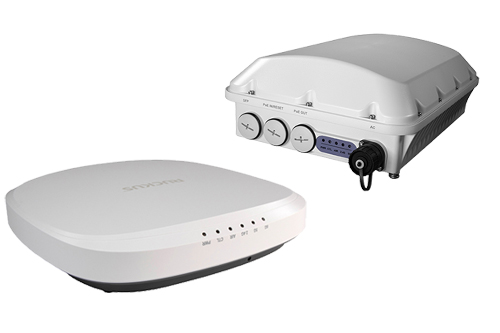
Improve performance of latency-sensitive apps with smart traffic management
Today’s Wi-Fi® networks often struggle with inconsistent performance due to the number of devices, the types of devices and the need to operate delay-sensitive apps like voice, video conferencing or surveillance security systems.
Unfortunately, traditional Quality of Service (QoS) mechanisms can’t fix this when client-side traffic tagging is missing, misconfigured or inconsistent across the network. Plus, multicast traffic—used by streaming and video surveillance services—tends to perform poorly over Wi-Fi due to the way multicast is handled at the physical layer.
SmartCast™ solves these problems by introducing dynamic, application-aware QoS at the access point (AP) level. Instead of relying on clients to tag traffic, this advanced Wi-Fi QoS engine inspects packets, classifies them, and assigns priority based on actual behavior—not on assumed markings.
The SmartCast algorithms automatically schedule and pre-queue traffic on a per-client, per-packet basis so no single user or application monopolizes resources. This allows for more fine-grained classification and scheduling than global network-layer QoS policies, which can’t account for device and environmental differences in real time.
In addition, our patented multicast traffic technology further enhances high-definition video streaming over Wi-Fi. And SmartCast is automatically enabled on every RUCKUS AP—so no configuration is necessary.
SmartCast benefits
Automatic traffic management
SmartCast is a sophisticated algorithm that provides precision bandwidth management and traffic shaping to help IT teams meet service-level agreements (SLAs) for video, voice and data. It’s automatically enabled on every RUCKUS AP—so no configuration is necessary.
Reduced latency and jitter
By giving high priority to delay-sensitive apps such as voice and video streaming, SmartCast eliminates lag and jitter to deliver a more outstanding user experience. What’s more, the RUCKUS patented multicast traffic technology further enhances high-definition video streaming over Wi-Fi.
Increased efficiency and capacity
SmartCast employs sophisticated load balancing and band steering techniques to enable clients to efficiently use the AP and spectrum resources. It optimizes use of available spectrum in high-density and diverse client environments with airtime fairness. This is ideal for high-density client environments such as stadiums, schools and hospitals where many users concurrently connect to the WLAN.
SmartCast is included on every RUCKUS AP

RUCKUS wireless APs
Experience optimized wireless connectivity and intelligent traffic management with RUCKUS indoor and outdoor access points. Our Wi-Fi network solutions are designed to provide secure, reliable access no matter how tough the environment.
Featured resources

SmartCast: An advanced Wi-Fi quality of service engine
SmartCast™ is a sophisticated quality of service (QoS) engine designed to maximize the reliability and performance of delay-sensitive applications, such as IP-based voice and video over 802.11 networks.

Strengthen coverage with IP video surveillance over Wi-Fi
Axis Communications and RUCKUS Networks cover all your locations with high-quality video and easier operations.

Why is it so hard to deliver reliable Wi-Fi?
The explosive growth in devices and applications has resulted in an insatiable demand for faster and better for over a decade. During this time, Wi-Fi has proven to be a cost-effective method for providing devices’ and users’ network connectivity.
FAQs
SmartCast is our intelligent Wi-Fi QoS engine. It classifies, prioritizes, and schedules traffic in real -time to ensure performance for voice, video, and latency- sensitive applications—especially in high-density or unpredictable environments. Networks need it for users who rely on real-time apps like Zoom, Teams, VoIP or streaming.
Unlike traditional QoS that relies on pre-tagged traffic (like DSCP), SmartCast automatically classifies and prioritizes traffic per device and per application flow, even when tags are missing or incorrect. It also converts multicast to unicast, ensuring smoother video streams and fewer drops.
Yes. SmartCast doesn’t depend on the client to tag traffic. It performs deep packet inspection and real-time classification, ensuring that even non-enterprise or misconfigured devices get appropriate QoS handling.
Absolutely. SmartCast is designed for high-density, mixed-client environments, ensuring fair airtime allocation and traffic shaping across many users—while still protecting performance for critical apps like voice, video, or medical data.
No. Manual tagging is not required. SmartCast is built -in and automatic on supported RUCKUS APs and controllers. You can apply policies if needed, but SmartCast optimizes traffic out of the box.

